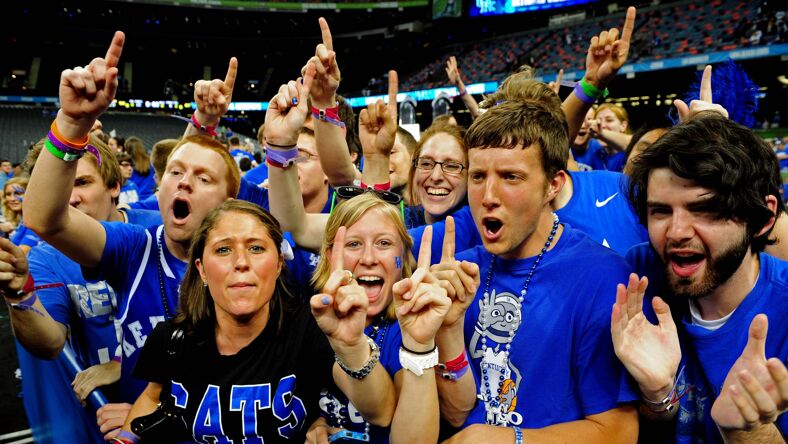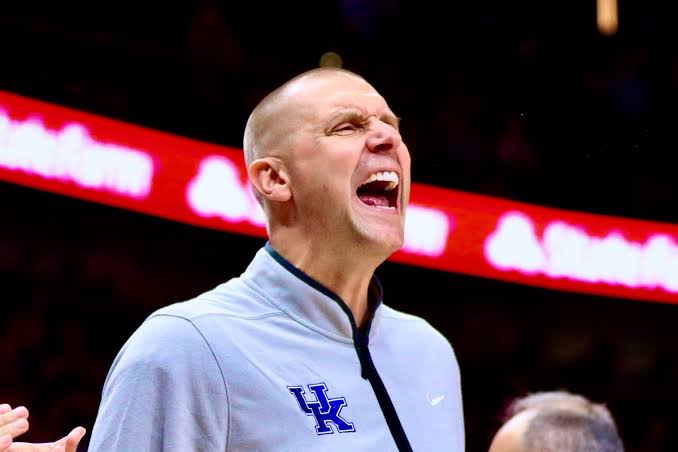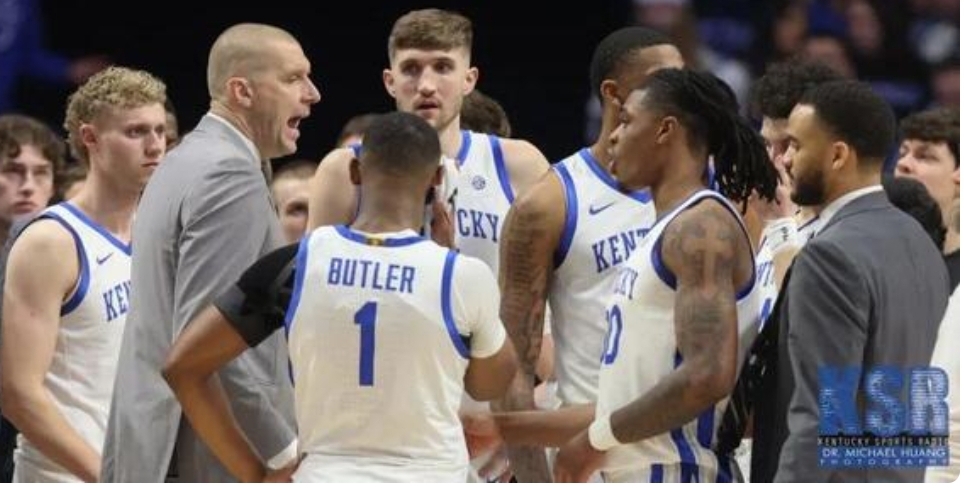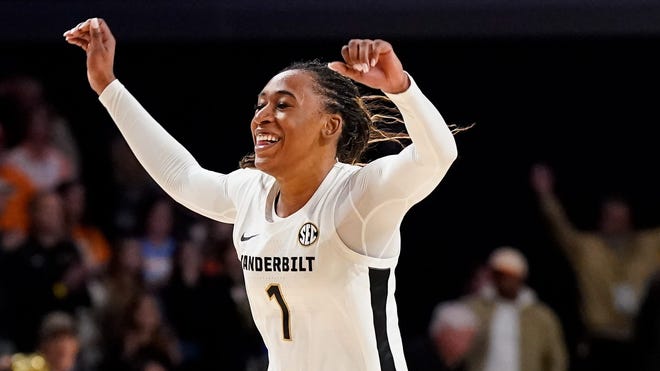For me, Kentucky Wildcats basketball isn’t just a sport—it’s a defining element of who I am. It shaped me into the fan and queer comedian I am today. Even after leaving the Bluegrass State, I continued to feel the pull of the game, and the memories of my childhood and family traditions kept me deeply connected to the Wildcats.
Reflecting on my earliest years, I recall two lessons that have guided me through life. The first was a simple yet essential one: learning how to tie my shoelaces using the bunny-ear method, ensuring a double knot that held fast. Nearly every child masters this skill, but it was the second lesson that truly set my future path in motion—developing an enduring dislike for Duke. I remember that my disdain for Duke wasn’t just an offhand remark; it was woven into my very identity from a young age. Even though I would never meet the person behind that notorious image, my first memories are filled with that spirited rivalry, an emotion that has defined much of my relationship with basketball.
In 1992, the legendary Christian Laettner emerged as a figure who, for many in Kentucky, embodied the archetype of the enemy. Teachers used him as an example of a villain, preachers wove his image into sermons about forgiveness, and even grandmothers fervently wished for better seasons for our boys after his performance. Basketball in Kentucky isn’t merely a pastime—it courses through the veins of its people. Like many from my hometown, I was raised in an environment where the game was synonymous with life, a culture where every win, loss, and rivalry became a part of your personal story.
Basketball was a family affair, interwoven into our family history through generations. One of the treasures my family holds dear is an old photograph of my great-grandmother, Ollie, proudly posing with her childhood basketball team. The love for the game did not end there; my papaw later became the leader of his high school team in the 1940s, and my uncle went on to dominate on the college courts, standing tall at 6-foot-11. My sister even found her niche on one of the region’s most storied high school teams, the Lady Dogs. With such a legacy, it seemed impossible not to be immersed in basketball culture. And yet, despite being surrounded by these vivid memories and the passion of my family, I was never naturally gifted on the court.
I vividly remember my papaw outfitting me with “dribbling goggles” and sending me out to practice on our front yard. No matter how much I practiced, my chubby little self—with my unabashed adoration for someone like Rosie O’Donnell—could never quite find my rhythm with the ball. My mom would cast a look that said it all: “The basketball gene just skipped us.” Those early experiences planted a seed of resentment. I began to wonder why, in a town where everything of value seemed to revolve around basketball, my own abilities were so lacking.
Eventually, I left the mountains of Appalachia to chase my dreams in the bustling cities of Cincinnati and later Chicago. In these urban landscapes, I discovered a kind of freedom and independence that allowed me to explore other facets of my identity. With this newfound liberty, I gradually stopped watching every game with the same intensity. Yet, each call from home would update me on the latest Kentucky Wildcats news. I learned about the controversies—like how Tubby’s win was only celebrated because of Pitino’s team, or how Billy G. was tarnishing our reputation, and even that despite Calipari’s credentials as a good coach, he was someone you couldn’t fully trust. These snippets from home served as a comforting reminder of my roots and kept me tethered to the traditions I once took for granted.
Living in the biting cold of Chicago only amplified my yearning for a taste of home. My days were spent caring for children as a nanny, while my nights I dove headfirst into the unpredictable world of comedy—a field as unorthodox as it was unathletic. In a city as vast as Chicago, I believed I would find other Kentucky Wildcats enthusiasts. That belief led me to a small bar near my apartment called The Pony Inn, a place where fellow fans gathered to relive the excitement of each game.
The community I found there was overwhelming. For one memorable game day during the 2013-14 season, I took a bold step. I enlisted every Kentuckian I knew and marched to the bar in full support of our team. Without owning any official Wildcats merchandise, I visited a local custom T-shirt shop in Wrigleyville and got one made especially for the occasion. On that day, I anticipated only a few die-hard fans, but to my surprise, the entire bar was awash in blue and white. The sight of so many passionate fans filled the room, enveloping me in a sense of warmth and belonging similar to a well-worn bourbon-soaked blanket. That season, I made it a point to watch every game, rekindling my love for a team that was more than just a pastime—it was my home.
Over time, my focus shifted increasingly to women’s basketball. As my papaw used to say, “If you want to watch the game of basketball, you watch women play.” His words resonated with me, and I embraced the opportunity to support the women’s side of the sport. Now, as I look forward to the NCAA March Madness tournament, I am thrilled to see what Coach Kenny Brooks will achieve with our team in the coming seasons. There’s a sense of rejuvenation in being a part of the Big Blue Nation at a time when every game carries the weight of tradition and progress.
Today, my journey reflects the complex tapestry of identity, family, and fandom. The echoes of my childhood, the rivalries that fueled my passion, and the bittersweet memories of personal struggle have all come together to shape a unique narrative. My story isn’t just about being a fan—it’s about finding one’s place, both on and off the court. As I continue to cheer on the Wildcats and now support the rise of women’s basketball, I remain proud of the legacy that ties me to my roots and excited for the future of the game.
Alongside my personal journey, I’ve found a platform with Jockular—a podcast created by ardent women’s sports fans for the community that loves the game just as much as I do. With hosts like E.R. Fightmaster, Tien Tran, and myself, we celebrate out athletes and share inspiring stories from the LGBTQ community. Our work, produced with the help of Harry Nelson and Charlie Smith, offers a unique perspective on women’s sports and connects fans across various platforms such as Spotify, Instagram, YouTube, and Patreon. It’s a way to keep the conversation going and ensure that every passionate voice is heard.
Ultimately, being part of the Kentucky Wildcats family means more than just following a sports team—it’s an embrace of life, history, and the power of community. There has never been a better time to belong to the Big Blue Nation, and I am grateful for every moment that basketball, in all its for
ms, has enriched my life.



